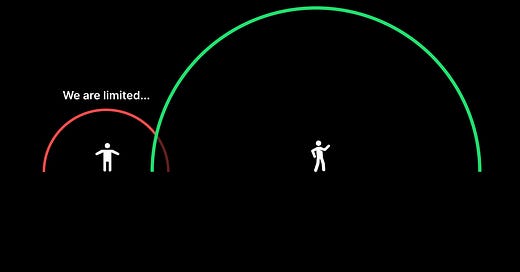You may have heard that 2025 is the year of agents and that some companies claim to replace entire teams with AI agents.
I believe we’re limited…
…by our own vision:
The reality is that the next decade of work will be fundamental for human prosperity: we can redesign work itself.
But there’s an uncomfortable truth - most organizations sleep-walk into a future they haven't consciously chosen.
I've noticed a pattern after advising dozens of companies (and studying countless more) on responsible AI implementation. Leaders broadly fall into two camps:
those who see AI as a cost-cutting tool to "optimize human resources"
and those who recognise it as an opportunity to fundamentally reimagine work with human dignity at the centre.
The difference between these mindsets will determine whether your organization creates a future of enhanced human potential or accelerated inequality.
Let me share three critical insights that will help you position yourself and your team for success:
The hidden cost of the “efficiency first” mindset
Many leaders approach AI implementation through a purely economic lens: maximize output, minimize costs. But this narrow view misses something crucial: humans aren't just biological circuits that must be optimized.
When we reduce people to resources, we unconsciously create systems that strip away dignity and meaning. I've seen companies implement AI solutions that saved a few hundred thousands in operational costs - only to face crippling turnover and engagement problems months later.
Instead, start with this question: "How can AI enhance human capability while preserving dignity?" This shift in perspective leads to dramatically different (and more successful) implementation strategies.
Capitalism’s paradox
Let’s face the elephant in the room.
The current economic incentives driving AI adoption are creating a winner-takes-all dynamic. Large tech companies are rapidly consolidating control over the primary engine of future economies—AI-augmented labour.
But it doesn't have to be this way. Forward-thinking organizations can discover that prioritizing ethical AI implementation actually creates sustainable competitive advantages:
Higher employee retention
Stronger innovation capabilities
Greater customer trust
More resilient operations
The 4-hour workweek may no longer be utopian
The most exciting possibility is that we have a historic opportunity to dramatically reduce working hours while maintaining (or increasing) productivity and compensation. However, this future must be consciously designed.
How can you position yourself and your organization to capture this opportunity?Reframe AI from "efficiency tool" to "human enhancement platform"
Audit current processes for opportunities to augment (not replace) human capabilities
Prioritize projects that eliminate drudgery while amplifying creativity and strategic thinking
Build ethical guardrails before implementation
Establish clear principles for AI deployment that protect human dignity
Create feedback mechanisms to catch unintended consequences early
Invest in human potential
Shift training focus from "AI-proofing" jobs to developing uniquely human capabilities
Create space for experimentation and learning
Design for reduced hours from the start
Set explicit goals for how AI-driven productivity gains will benefit workers
Create pilot programs to test reduced-hour workweeks
A bigger vision
The future of work stands at a crossroads. Technology can create unprecedented human flourishing—but only if we consciously design for it.
I'm working on a comprehensive framework to help organizations navigate this transition ethically and effectively. If you'd like to be part of this conversation and receive practical strategies for implementing these principles, reply to this email with "HUMAN FIRST."
Let's build a future of work that enhances human potential rather than diminishing it.
Until next time,
—a
P.S. What's your biggest concern about AI and the future of work? Hit reply and let me know - I read every response.
P.P.S. Share this to others who may benefit from a bigger vision
____
The thoughts and analyses on Honest AI are (always) the author’s original thinking. He used Claude 3.5 Sonnet to polish English, flow and structure.




